PRESERVING A MILITARY LEGACY FOR FUTURE GENERATIONS
The following Reflections represents SSG Peter Olsen’s legacy of his military service from 1967 to 1973. If you are a Veteran, consider preserving a record of your own military service, including your memories and photographs, on Togetherweserved.com (TWS), the leading archive of living military history. The following Service Reflections is an easy-to-complete self-interview, located on your TWS Military Service Page, which enables you to remember key people and events from your military service and the impact they made on your life. Start recording your own Military Memories HERE.
Please describe who or what influenced your decision to join the Army.
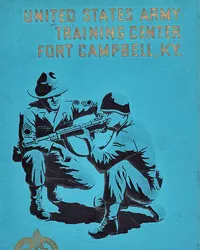
Too much partying, and it turned out a 1.2 GPA would not keep me from being drafted. So I volunteered for the draft. Once I got back from Vietnam, I actually received 2 degrees and maintained a 3.7 GPA while working full-time as a police officer.
Funny story – After I left school to volunteer for the draft, I thought it would be a quick process. Not so. The first month my draft board did not meet for some reason. The second month the draft board did not take up my request. The third month a draft board member died of old age – no meeting. In the 4th month, the draft board finally met and acted on my request but did not approve it until the 5th month.
All of this time, my dad said, “Son, you need to get a job.” So I did and worked in a local dog food factory until I went to downtown Milwaukee for my physical. While working for the dog food factory, I had injured my back. The draft board doctor looked at the x-rays of my back and said, “I can see that you injured your back, and it is healing, but we treat back injuries like broken bones – once they heal – they are healed. So as far as I am concerned you are drafted”. And that was that.
Interestingly, I did not have any back problems in the Army until shortly before I was scheduled to leave Vietnam, and I reinjured my back. Naturally, I didn’t mention it when I left Vietnam, and I should have. Too bad – soo sad!
Whether you were in the service for several years or as a career, please describe the direction or path you took. What was your reason for leaving?
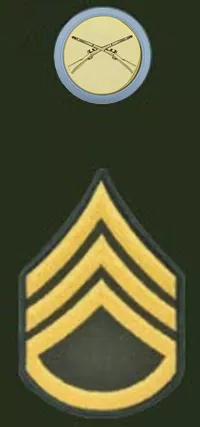
I volunteered for the Non-Commissioned Officers Candidate School (Infantry – Fort Benning, Georgia Class # 7-68) and came out of that school a Sergeant E-5, MOS 11B40, Light Weapons Infantry. Went directly to Vietnam. Before my tour ended (I was a Staff Sergeant at the time), I was offered an immediate promotion to 1st Lieutenant (Mustang officer).
All I had to do was re-up and complete OCS. I asked what my first assignment would be after being commissioned, and I was told I’d be back in Vietnam doing what I was doing now. I politely declined the offer because I figured I had used up all of the luck I had up to that point. My Captain said that he thought I was making the correct decision.
The thing is that I liked the Army, and I was good at my job. As a platoon Sergeant in combat, I knew the platoon leaders’ (typically a Second Lieutenant’s job) responsibilities because there were plenty of times we didn’t have a platoon leader, and I had to do that job too. Had the Army guaranteed I wouldn’t be back in combat on my second Vietnam tour – I would have re-upped – gone through OCS and probably made it a career. There were just so many times I had escaped death and injury during my tour in Vietnam, and I just thought I didn’t have any luck left, and apparently, my Captain agreed with me.
If you participated in any military operations, including combat, humanitarian and peacekeeping operations, please describe those which made a lasting impact on you and, if life-changing, in what way?
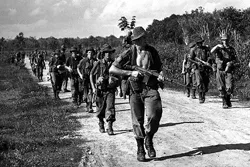
Well, the interesting thing is that I never actually knew if my platoon (Bravo Company) was involved in any specific operations except TET. We just went out on our own for search and destroy missions and ambushes, or there would be Company and Battalion operations we participated in all of the time. Those assignments came out of battalion and were relayed down to platoon level. Because the politicians deemed “Search and Destroy” horrible, they changed the name to “Reconnaissance In Force” to make it more palatable at home. REMF’s and jerks – all of them.
So you ask, “Did anything have a lasting impact”? The answer is yes, all of it. Constant fear, constant concern for my men and our unit. To this day, I still look for snipers (stupid, I know – but I do) to react to situations that occur around me, wondering how my platoon members died after I left. What happened to them. Who made it. Who didn’t? Could I have done better? Made better decisions.
I am a member of a local American Legion Post and speak at meetings from time to time about my experiences. The nice thing is that we are all a bunch of “old guys and girls,” and we are lucky if we can remember what we ate for breakfast that morning – so I figure my other Post members will forget what I talked about after a year or so and I can tell them all over again. It turns out it’s true!!! I learned that I have to ask my audience how many actually served in combat and were shot at because 9 out of 10 members did not experience combat and didn’t know anything about combat or weapons or tactics. So I had to be careful to include explanations of what weapons we carried, show pictures of them, and on and on so they could truly understand what we went through.
I should mention here that one of the lessons I learned is that if the United States Army firmly decides to accomplish a task – it will be accomplished – no question about it. We could have won that war if the REMF’s and politicians had been willing to do what was necessary to win. In the First Infantry Division, we were constantly asked to do things that any sane person would have looked at and said, “That isn’t possible and can’t be done.” Wrong! We constantly traveled the jungle all Day, set up ambushes all night, and did it Day after Day after Day with constant fear and little sleep. No sane person would have said that we could do what was asked of us, and still, we did it time and time again. I am sure it was no different for WW1 and WW2 and Korean troops, but the point was that left alone and given the resources we needed – we would have won.
Did you encounter any situation during your military service when you believed there was a possibility you might not survive? If so, please describe what happened and what was the outcome.
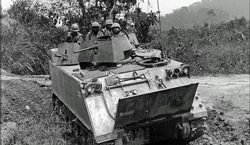
Let’s see. Ambushed three times where the rounds fired at me – hit me but impacted my gear and not me. Just some severe bruising. Almost hit by some bombs dropped by air support in another firefight. A short round by our own artillery almost took us out, numerous firefights where buddies were killed around me. I went online one time to enter a large Vietcong base camp, and we had to endure fire ants because we couldn’t break the line. Several enemy machine-guns bunkers. So there were plenty of opportunities not to survive.
Try this one out and tell me what you would have done. I was out and in charge of my platoon one Day (no officer assigned at that particular time) on a search and destroy mission looking for Vietcong, NVA, weapon caches, whatever we could find. We knew we had some Viet Cong soldiers following us, but they kept their distance and remained out of sight. Not that you could see much anyway. So we came to an open field, and in the middle of the field was an island of trees. Me – being as smart as I thought I was – thought, “Gee, that might be a good place to hide some weapons.” The problem was that the Island of trees was out in the center of the field, and by walking out into the field, I was opening all sorts of opportunities for the enemy to fire at us if they were around. So – being as smart as I thought I was – I sent one squad in one direction and another squad in the other direction to walk around the outside of the field to see if it was safe from that aspect. It turned out it was, so we entered the field and walked to the Island of trees.
When we got there, we did find a weapons cache. Okay – called it in on the radio – and the brass said they didn’t want the weapons and ordnance. I think they did want the weapons (they always did for bragging rights) but didn’t have a chopper available to send out to pick them up. So they told me to blow it all in place and continue our operation. So – me – being the smart guy, I was decided to use a little C-4 explosive with a delayed fuse and blow it all up. We set the fuses and walked away. Ten minutes later – safely away from the explosion, we didn’t hear a boom boom. Oh Oh! What happened. We turned around and had to go through the same drill again and found everything intact except the fuses were pulled out of the C-4. Hmm – the only ones that could have done that was the enemy. It turns out they had been following us – had been watching us – weren’t enough of them to stop us, so they just messed with us to let us know they were there. This time we stuck around and blew it all to smithereens. Lesson learned? Stick around until you know you’ve accomplished your mission.
Another time we were tasked with joining a bunch of APCs (armored personnel carriers) to head out to an operation. We rode on top of the carriers because the temperature inside the APC was too hot. On the way, we were hit by rockets being fired at the APCs from a tree line a hundred yards away. Not being armored troops, we didn’t know at the time about an armored reaction that was called “Ready Reaction.” But we learned. Immediately upon being fired at, the APCs sped up as fast as they could go – regardless of road conditions – and set up a position that allowed them to fire their 50 caliber guns in all directions. We could barely hold on, and some troops fell from the tracks and were run over. Once we stopped, it was our job to jump off the APCs and go out to engage the enemy. The problem was that when you jumped off the APC, you were on – you had to duck down because the 50 caliber guns were firing down toward the enemy rocket positions. Several of our men had their heads blown off because they did not duck down. It was a lesson learned the hard way and could have been prevented had someone briefed us ahead of time of what happens during an armored vehicle “Ready Reaction.”
Of all your duty stations or assignments, which one do you have fondest memories of and why? Which was your least favorite?
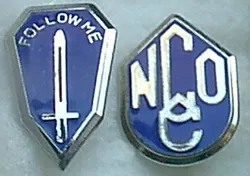
If you don’t count Vietnam, I never really had a bad duty assignment. And even Vietnam had its good times along with the bad times. I think I liked NCOC Leadership School at Fort Benning the best, and their motto is simple and to the point “Follow Me.”
I remember one funny thing that happened to me at NCOC School. NCOC school and OCS were very similar in a lot of ways. As candidates, we had to move to a side wall in a corridor when the School’s Instructors came down the hall. We had to stand at attention and wait until the staff member passed – saluting if it was an officer. One Day a lieutenant (I think – officer of the Day) came along near his office. I took my position against the wall, and I think he just wanted to mess with me because as he walked through the door to his office, he said, “Candidate – drop and do push-ups until I tell you to stop.” Now you need to understand that I was in incredible shape at this point in my Army life, just having completed Basic and AIT training. So I dropped and started counting push-ups out loud. And they were the good push-ups – not the lazy kind. I remember that when my count had gotten well into the ’90s, and I was still going strong – he walked over and said, “Get the hell out of here and don’t ever clog up the entrance to my office again!” Funny as hell – but I got him!
Another benefit to NCOC School was that they taught me how to study. Even though the high school I went to was college-oriented – I skated by without too much study. At Fort Benning, they made us study two hours a night – every night – mandatory – and had an instructor there to verify we were studying and answer any questions we had on any subject (weapons, tactics, map reading, geography. history – anything). It was at Fort Benning NCOC Leadership School that I truly learned that if you want to want to learn truly – and in this case, our lives and the lives of our men depended upon it – you had to put in the serious time necessary and not be afraid to ask questions when you were confused or didn’t know. After I got out of the service, I was eternally grateful for that lesson in learning.
From your entire military service, describe any memories you still reflect back on to this day.

I am bothered that I can’t remember the names of the men I served with – all brave and all heroes. I am bothered by the fact that my records were destroyed in a fire in St. Louis. I am bothered that all of the pictures I took in Vietnam were either stolen, mishandled, or lost by REMF’s. I am bothered that all of my gear back in the base camp was either stolen or lost by the REMF’s. I am bothered by how the war was fought so stupidly and by the ease and cavalier attitude upper brass had in handing out assignments that resulted in unnecessary deaths. Really – some very stupid decisions and little understanding on how to fight the war.
To this Day, I cannot drink a cold glass of water without thinking of the hot canteen water we drank every Day. Whenever I get in the shower, I think of the days and weeks that went by, only taking advantage of rain or a river or streams we came across to bathe or use for canteen water. Have you ever drank water with halazone tablets mixed in? Horrible stuff.
Tunnel operations around Chu Chi (sp?) were never fun. First of all, you had to be small to get into the tunnels, and it was scary scary stuff. I still marvel that there were always soldiers who seemed to have a death wish and wanted to go down into the VC tunnels. We fastened ropes to them so we could drag them out if needed. But they went down into the tunnels with a .45 automatic and a flashlight. Talk about claustrophobia and danger around every corner! One time the battalion brought in blowers and dropped smoke into a tunnel – ran the blowers to see if smoke came out of the ground anywhere else – and low and behold, there was smoke coming out of other tunnels all around us. We were lucky that the Vietcong didn’t pop out of those tunnels and shoot at us. Fortunately for me, I was either a squad leader or platoon Sergeant and didn’t have to go into the tunnels – besides that, I was too big and didn’t fit. One time we found an entire underground hospital that had been abandoned just before we arrived.
There are too many to post.
What professional achievements are you most proud of from your military career?
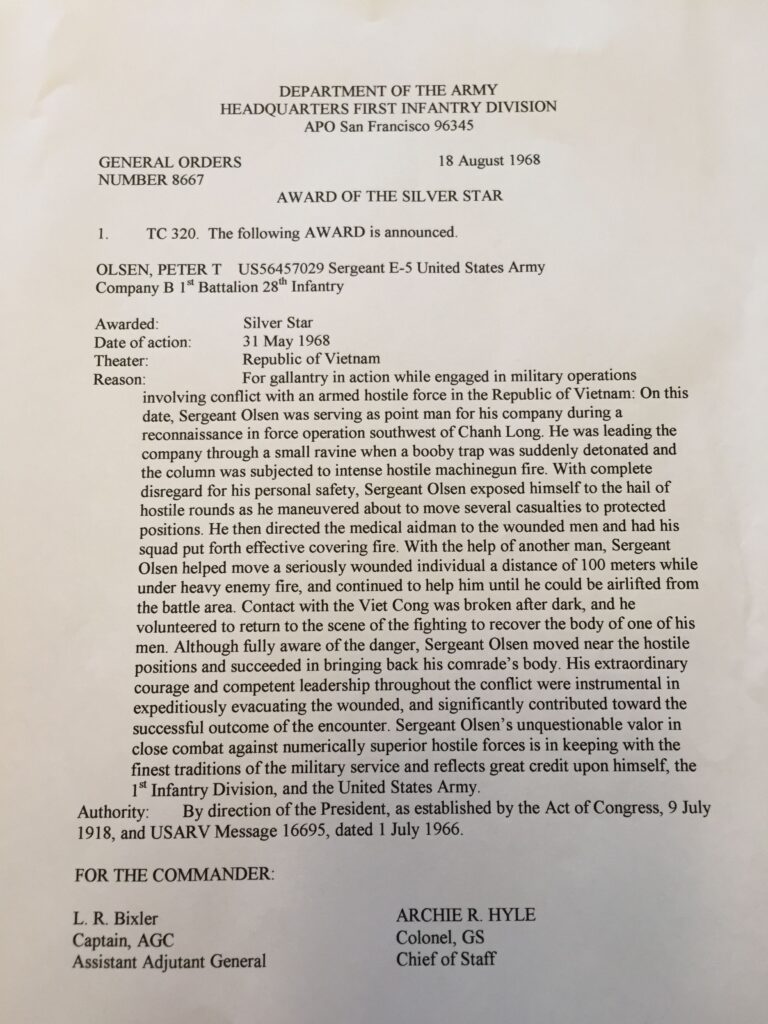
Earned a Silver Star and a Bronze Star. But the proudest memory is that I cared for and took care of my platoon and did my duty the best way I knew how. In retrospect, we were not trained well. I know the cadre did their best to train us, but the training did not hit the mark in many ways.
Of all the medals, awards, formal presentations and qualification badges you received, or other memorabilia, which one is the most meaningful to you and why?
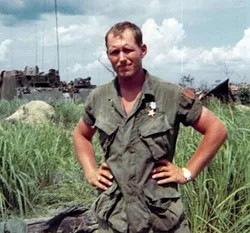
My Silver Star was personally pinned on me by General Keith Ware, a World War II Medal of Honor recipient. He died several months later in a helicopter crash (shot down) while observing a large ground firefight. At the time, General Ware was in charge of the First Infantry Division in Vietnam.
As a side note – Geral Ware’s son and I served together in our AIT training company well before I ever got to Vietnam.
Which individual(s) from your time in the military stand out as having the most positive impact on you and why?
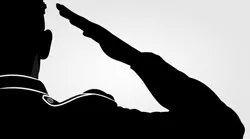
There were many, but I can’t remember their names. Sergeant Howard – Bravo Company’s mortar platoon Sergeant helped me many times and saved our ass a few times as well. My squad leaders were all top-notch, and there were times when I had to ask them to help me solve a problem or make a decision that would impact the rest of the platoon. They came through – every time.
List the names of old friends you served with, at which locations, and recount what you remember most about them. Indicate those you are already in touch with and those you would like to make contact with.
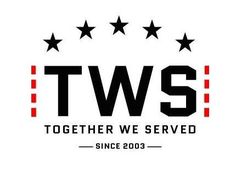
I can’t do that. I don’t know, and it seems I can’t find out. Maybe this website will help.
Can you recount a particular incident from your service, which may or may not have been funny at the time, but still makes you laugh?
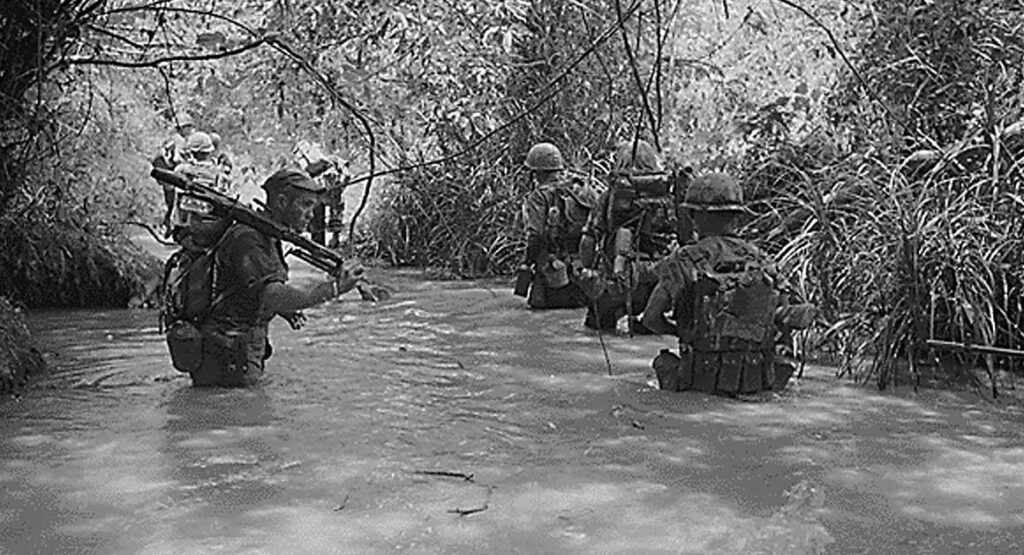
Hell yes. One time I got my platoon lost, and we were literally walking in a river during the dark. I asked my squad leaders if they knew where we were and one of them said yes, he thought so. I put him in charge, and he led the way to the ambush site we were supposed to set up for the night. When we arrived where he thought we should be, we really didn’t know if it was the correct spot. So we decided to ask Sergeant Howard in our mortar platoon to drop a round on our ambush site coordinates. He asked if we wanted a flare or actual ordinance.
We looked at each other and said, “Well, if we drop a live round on the site, we will not only know where it is, but it might scare away any enemy soldiers that were there. Not a smart move. A minute later, we heard the mortar round coming in less than a hundred yards from where we were sitting. I set out a perimeter and set up the ambush where we sat, figuring that the mortar round may have driven the enemy towards us. It was pretty funny, but you had to be there to hear the “Holy Shits” as the round came in.
A lot of other funny things happened. Too numerous to tell.
What profession did you follow after your military service and what are you doing now? if you are currently serving, what is your present occupational specialty?

College. Police officer. I owned my own business along with a partner. I sold the business. Retired. Playing as much golf as possible.
What military associations are you a member of, if any? what specific benefits do you derive from your memberships?
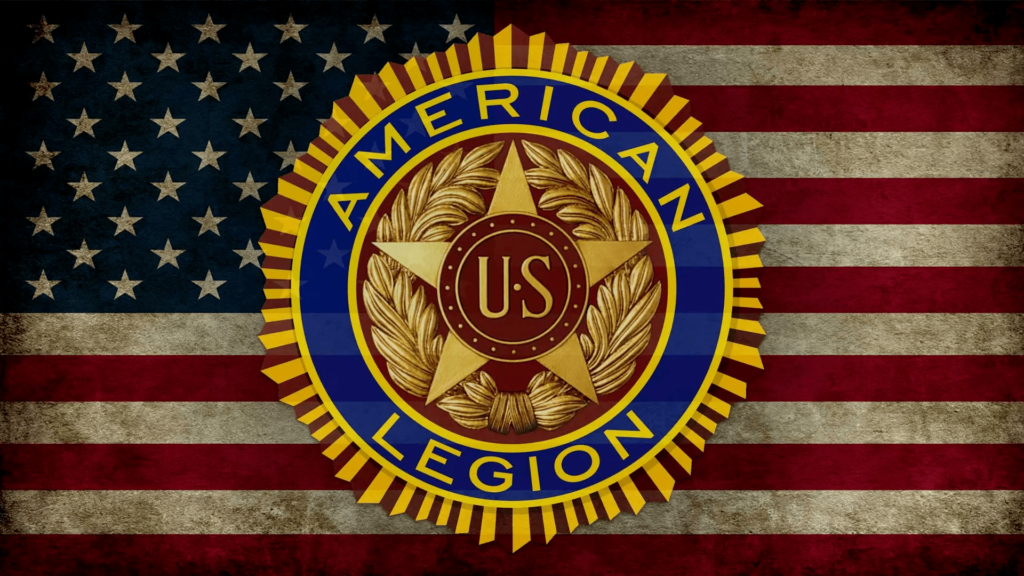
American Legion. Interacting with retired Veterans. Doing some good for vets and the community.
In what ways has serving in the military influenced the way you have approached your life and your career? What do you miss most about your time in the service?
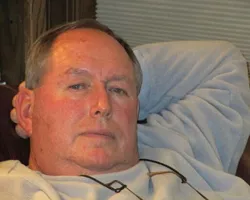
Despite attending a college prep school, it was the Army that taught me how to study and that paid off. It made me a man, and I never took my responsibilities lightly because I understood the ramifications my decisions had on other people and families.
Based on your own experiences, what advice would you give to those who have recently joined the Army?
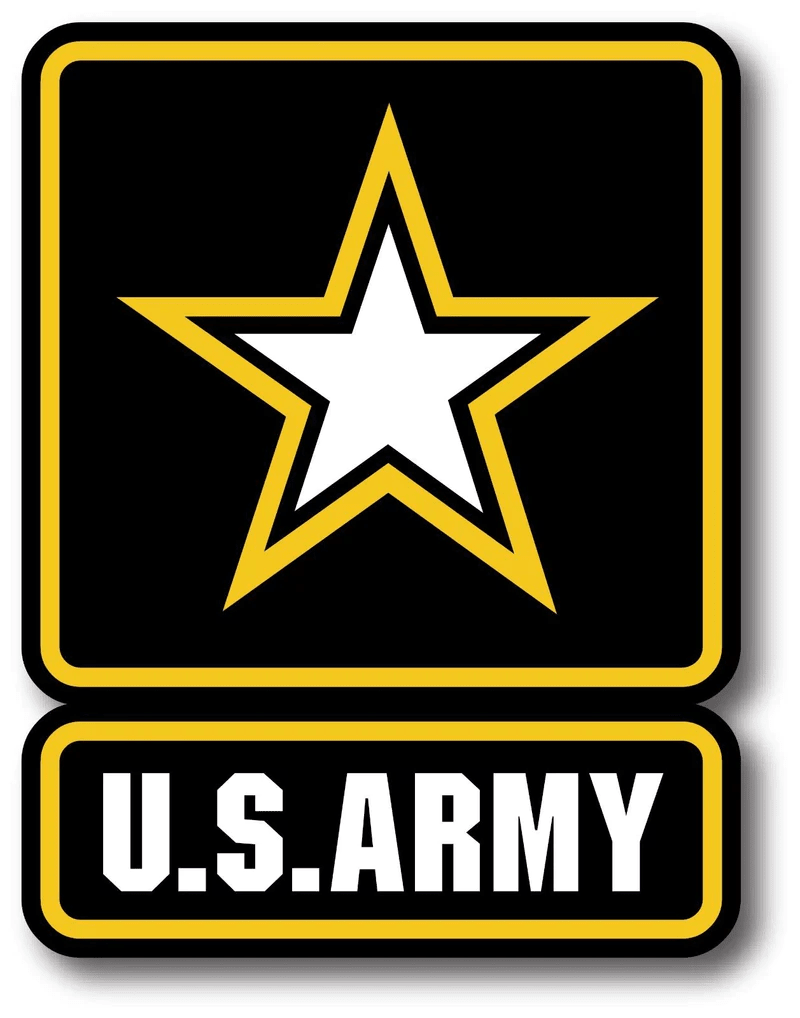
Figure it out quickly and don’t get involved in “woke” and liberal policies or people. Do your job and the next time you get the chance – do it better. YOU make a difference, even though it may not seem so at the time.
In what ways has togetherweserved.com helped you remember your military service and the friends you served with.
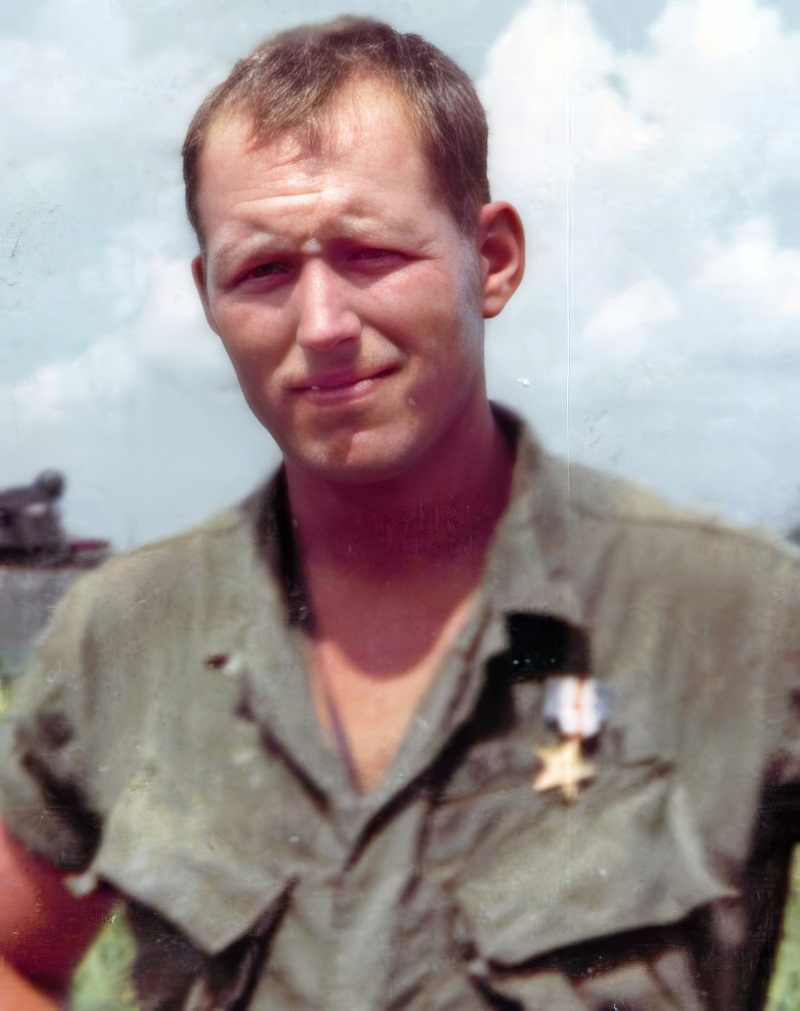
“Too early to tell. This was my initial response to this question, but now that I’ve had the opportunity to get used to the layout of Together We Served and its website, I can say more.
One of the ways TWS has helped me is through its identification of soldiers that served at the same time I was in Vietnam. I’ve spent a lot of time going through the service histories of soldiers that made it back, and I’ve searched diligently for names I thought I recognized but wasn’t exactly sure. I did notice that some of the men I served with were killed after I left them, and a few saddened me because they were good men (most but not all were good men – heroes. I knew a few that were not.) I never knew what happened to them until I discovered Together We Served.
I am grateful that I have at least a few answers I did not have before. There is some peace in that knowledge. I actually sent a note to a relative of one person that was killed after I left Vietnam. I don’t know if they ever received my message, but I guess it doesn’t matter. I said what I wanted to, and I hope they received the message. He was a good soldier, not full of himself – quiet and courageous. The knowledge of his death still saddens me.
So I have only good things to say about Together We Served. My platoon members were heroes in every sense of the word, and they had my back, and I had theirs. Looking back now, we were continually asked to do the impossible under insane conditions, and we did it without question over and over again. We just prayed we would DEROS out – jump on the Freedom Bird – and head back to civilization where we did not live in constant fear. I am thankful to TWS for helping me through this journey.
PRESERVE YOUR OWN SERVICE MEMORIES!
Boot Camp, Units, Combat Operations
Join Togetherweserved.com to Create a Legacy of Your Service
U.S. Marine Corps, U.S. Navy, U.S. Air Force, U.S. Army, U.S. Coast Guard
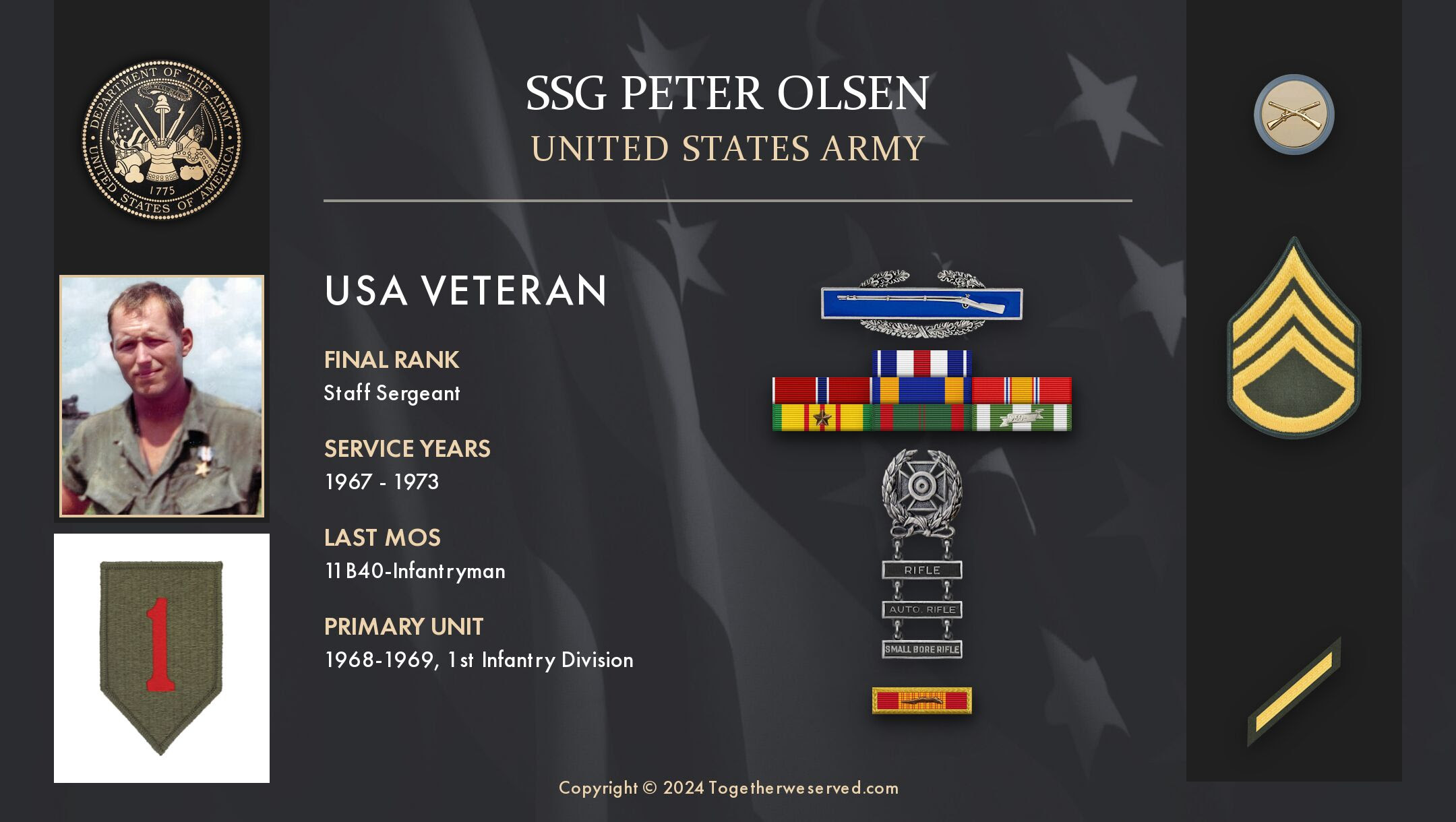
SSG Olsen,
My Vietnam experience mirrors yours. I was with the 1/506th Inf. 101st Abn. Div., December 1967 – December 1968. Our base camp was Phouc Vin and spent 6-7 months patrolling around that area (including Song Be and Chu Chi), until we moved up north to camp Eagle. I received two Army Commendation medals with “V” devices during that time. Three years ago I was diagnosed with throat cancer that has since been attributed to a compromised immune system because of agent orange exposure. We not only walked through it, but filled our canteens from streams and creeks that had to have agent orange runoff.
I agreed with you and experienced most everything you said, until you got to your advice to “don’t get involved with woke and liberal policies or people”. I think you would have to agree that an infantry unit is not composed of only conservative soldiers. 1967/68 was a very controversial time regarding race and the only time I witnessed a difference in what we preferred, was when we were in the NCO Club putting money in the jukebox to play the music we wanted to hear. Other than that, we were all together regardless of political or social differences. I don’t believe you can incorporate encouragement of political or social beliefs in a military unit, or more importantly a combat unit. I’m happy you’re home safe and can appreciate many of the experiences you had. If being a member of a combat unit taught me nothing else, it taught me that being Black or White, Christian/Jew/Muslim or Whatever, straight/ gay/transgender, when your in a foxhole, your either on my side or your not.